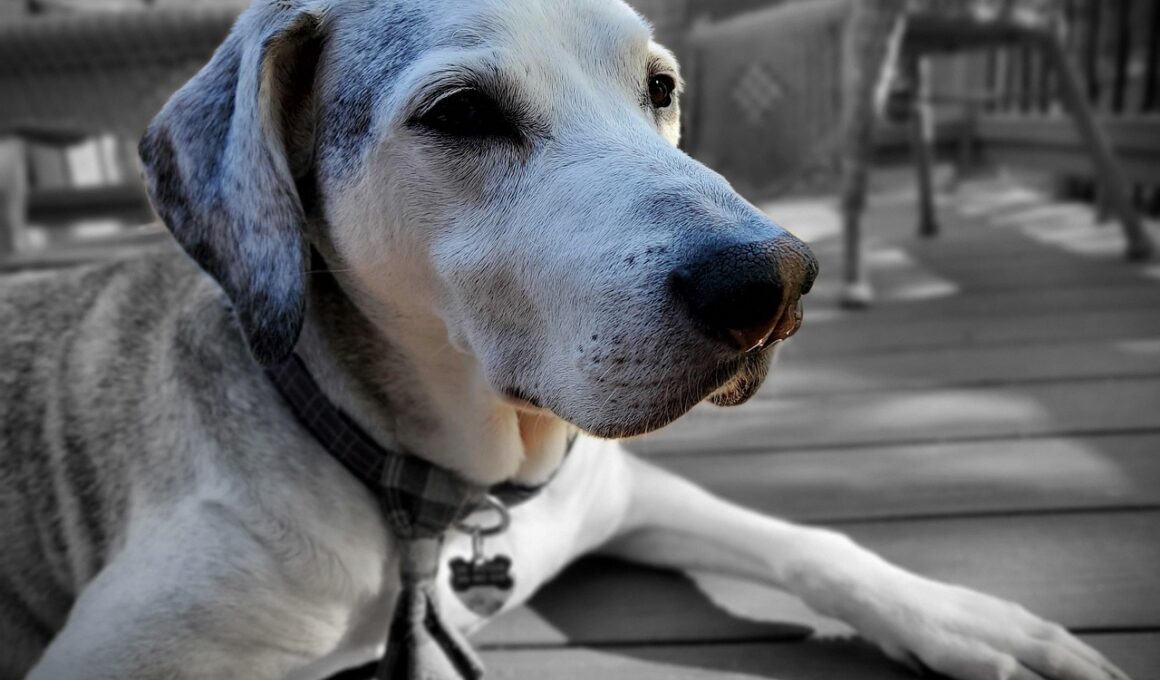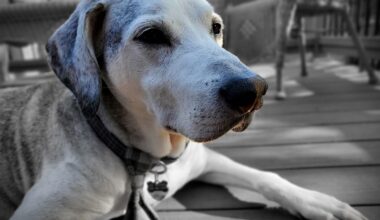Effective Exercise Routines for Senior Dogs to Maintain Healthy Weight
Maintaining a healthy weight in senior dogs is crucial for their overall well-being. As dogs age, their metabolism slows down, and they become less active, which can lead to weight gain. However, effective exercise routines can help counteract this effect. Senior dogs might face mobility issues, therefore, it is essential to adapt exercise regimens to their specific needs. Slow walks around the neighborhood or in a nearby park can stimulate them mentally while promoting physical activity. Always monitor their breathing and energy levels during these activities to ensure they are not overexerted. Additionally, short, frequent bursts of activity often work better than longer sessions. Consider incorporating fun games, which can keep your dog engaged while also providing an excellent workout. Finally, consult with a veterinarian before starting any new exercise program. They can provide tailored advice based on your dog’s health status and any potential limitations.
Gentle Swimming Exercises
Swimming is one of the best exercises for senior dogs, especially those with joint pain or limited mobility. The buoyancy of water allows dogs to move their limbs without putting undue pressure on their joints. Swimming also helps improve muscle tone and flexibility, making it an excellent option for weight management. Start by introducing your dog to shallow water gradually. Once they’re comfortable, consider investing in a dog flotation device for safety. Always supervise your dog while swimming to ensure they are safe and happy. To add variety to the swimming routine, try tossing a toy into the water for them to retrieve. This will not only keep their interest but also serve as a great way to combine exercise with playtime. Pair swimming sessions with appropriate land exercises to create a balanced fitness plan. Remember to rinse your dog off after swimming to remove any chlorine or salt. Swimming can be a fantastic way to help senior dogs shed some extra pounds while ensuring they still enjoy their exercise.
Walking is a simple yet effective way for senior dogs to maintain their weight. It provides not just physical exercise but also mental stimulation. Regular, short walks at a comfortable pace can help manage their weight effectively. When walking your senior dog, choose paths that are level and easy to navigate to avoid strain on their joints. Using a leash harness can also help reduce stress on their necks and spines, making the experience more enjoyable for them. If your dog struggles with traditional walking, consider using assistive devices designed for senior pets. Additionally, keep walks brisk but not hurried; allow your dog to explore their surroundings as this can make the experience enjoyable. Establish a consistent walking routine that fits your dog’s lifestyle. Consider walking with friends or other dogs to increase motivation and enthusiasm for the activity. Regular walking fosters social interactions, which greatly benefit your dog emotionally. Always carry water with you during walks, especially in warmer months, to keep them hydrated and healthy.
Interactive Playtime
Incorporating play into your senior dog’s daily routine is an effective way to keep them active and maintain a healthy weight. Engaging them in games that require minimal physical exertion can stimulate their minds and keep their weight in check. For example, gentle tug-of-war or fetching games using soft, lightweight toys can be fun without being overly strenuous. Puzzles and interactive toys are excellent companions for playtime as they combine both mental and physical challenges, keeping your dog active. Rotating their toys helps maintain their interest, encouraging more playtime. Opt for short 10 to 15 minutes play sessions several times a day. This can effectively break up their day and increase their overall physical activity. After playtime, reward them with healthy treats to reinforce positive behavior and motivate continuous play. Gradually increase the intensity of the games as your dog gains strength and confidence. Remember, achieving and maintaining a healthy weight is not just about exercise; it’s also essential to monitor their diet along with physical activities.
In addition to physical activities, mental stimulation is equally important for senior dogs. Activities that challenge their brains can reduce boredom and anxiety, which often contributes to unhealthy eating habits and excessive weight gain. Teaching new commands or tricks can stimulate their minds and keep their weight in check. Basic obedience skills like sit, stay, and down should be refined, but consider introducing fun tricks too, such as rolling over or playing dead. Engaging them in scent games, like hiding treats around the house or yard, encourages them to use their sense of smell, combining mental and physical challenges. Consider nurturing social interactions by arranging playdates with other friendly dogs, which can encourage a more active lifestyle. Incorporating dog-friendly brain games in exercises can significantly enhance their well-being. As a result, good mental health can ultimately lead to a more active lifestyle and help maintain their weight. Always reward their efforts during training with praise and healthy snacks, reinforcing the positive behavior and commitment to a healthy lifestyle.
Routine Veterinary Checkups
Regular veterinary checkups are crucial for the health and well-being of senior dogs. These visits provide an opportunity to assess their weight, body condition score, and overall health status. Apart from weighing your dog, your vet can help tailor an appropriate exercise routine that considers any existing health issues. Regular checkups also enable early detection of potential problems, such as arthritis or heart issues, which can influence exercise levels. Additionally, your vet can provide dietary recommendations to support a healthier weight. They may suggest specific meal plans or portion control techniques to ensure your dog maintains a healthy weight. Ensure to communicate any concerning behaviors or changes, such as decreased activity or unusual sleeping patterns. Following your vet’s advice can make all the difference in helping your dog lead a vibrant, energetic life. Also, keeping records of their weight changes and exercise routines can help monitor their progress over time. Remember, a collaborative approach will empower both you and your senior dog to make the healthiest choices.
Maintaining a healthy weight in senior dogs entails a combination of regular exercise, stimulating play, and proper veterinary care. Through activities like swimming, walking, and interactive games, owners can help their dogs stay active while addressing any mobility concerns. It is essential not only to focus on physical activity but also to engage dogs mentally to ensure comprehensive well-being. Be mindful of the need to adjust exercise intensity to accommodate the changing needs of senior dogs. Creating a routine that incorporates both physical and mental activities fosters their happiness and enhances their quality of life. Collaborate with veterinarians to ensure that exercise routines are aligned with health conditions, providing each dog with an individually tailored regimen. By following these guidelines, pet owners can certainly contribute to their senior dogs’ effective weight management. Staying observant to changes in behavior and physical condition is crucial, ensuring a proactive approach to health. Committing to their exercise routines and overall welfare leads to happier, healthier, and more active lives for our beloved senior dogs.
Every dog deserves quality care as they age, particularly concerning maintaining a healthy weight. The responsibility lies primarily with pet owners to ensure their companions lead active lives. Proper exercise routines tailored to individual needs can facilitate weight management, improve joint health, and enhance overall happiness. Delving into senior dog fitness might seem daunting initially, but with patience and proper guidance, you can develop effective strategies that yield positive outcomes. As we adapt and modify the activities in their routines, a collaborative approach with veterinarians helps create optimal plans suitable for health goals. This journey not only promotes weight management but also significantly contributes to your dog’s…


